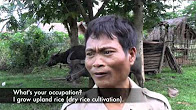Illegal Forest Production and Trade
This paper looks at the evidence on the
magnitude and impacts of forest illegal acts, examines the
vulnerabilities of the forest sector, and proposes a
strategy for combating forest crime. Forest crime
prominently includes illegal logging but acts against the
law also affect other sector operations such as forest
products transport, industrial processing, and trade. Almost
universally, criminal exploitation of forest products and



